'I probably should have been killed doing what I was doing'
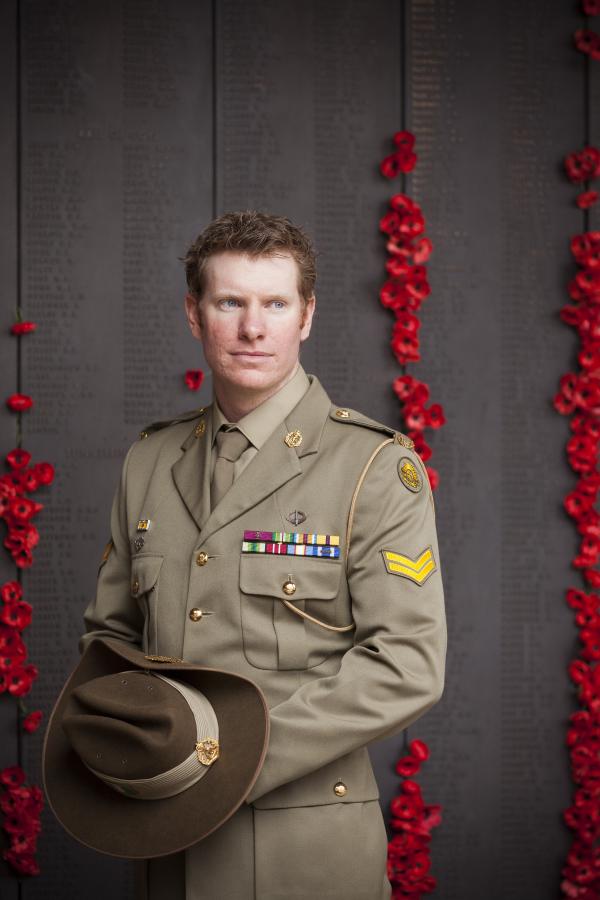
Corporal Daniel Keighran VC at the Australian War Memorial. Photo: Courtesy Defence
As a 17-year-old army recruit, Corporal Daniel Keighran VC would stand to attention outside his room each morning and stare at the portrait of Albert Jacka, one of Australia’s most famous Victoria Cross recipients from the First World War.
“I have a vivid memory of getting off the bus at Kapooka on my first day in the Australian Army and being assigned to 32 Platoon amid much yelling and screaming,” he said.
“In our barracks was the Hallway of Valour, funnily enough, so every morning when we’d run into Hallway 32, with your bed sheet over your shoulder, there was Albert Jacka across from me, and I would stand there reading and rereading his citation, or the others around it, as we were doing roll call and I was waiting to hear my number yelled out.”
Little could he have imagined that one day his photograph would appear alongside that of Albert Jacka’s. But that’s exactly what happened. Ten years ago, on 24 August 2010, Daniel repeatedly exposed himself to enemy fire during a three-hour battle in the village of Derapet in Afghanistan, identifying targets and drawing fire away from his mates who were trying to save the life of a mortally wounded comrade. For his actions that day, Daniel became the 99th Australian to be awarded the Victoria Cross, the pre-eminent award for acts of bravery in wartime and Australia’s highest military honour.
“I look back and think I was just doing my job that day,” he said.
“I probably should have been killed doing what I was doing. I could see the bullets strike the ground in front of me and behind me, and I could hear them fly past my head …
“And then the Victoria Cross came along and changed everything; how could it not?”
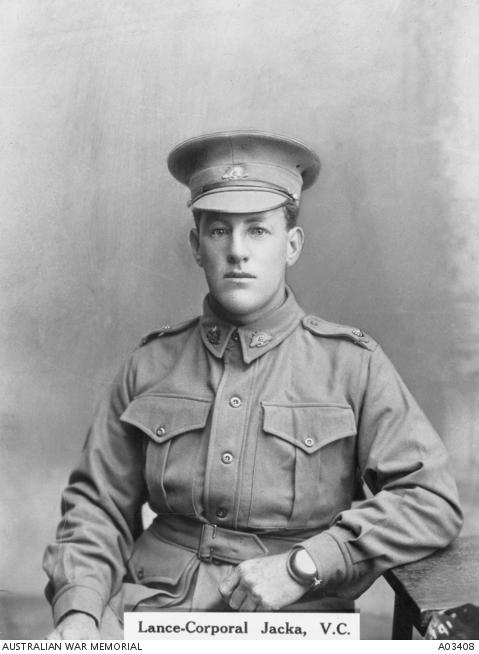
Albert Jacka was the first Australian recipient of the Victoria Cross in the First World War.
A humble man who describes himself as a classic introvert, Daniel Keighran was born in Nambour, Queensland, in June 1983, the youngest child of Judith and Ian Keighran. He spent his early years with his mother and his older sister Susan at Maleny on the Sunshine Coast where he was close to his grandparents.
When Daniel was 11, his father showed up for the first time in Daniel’s life. It would turn his world upside down. His father uprooted the family, moving his wife and children four hours away from their grandparents and their home on the Sunshine Coast to live in a rough shack with dirt floors on a property at Lowmead, 100 kilometres north of Bundaberg. They bred paint horses and were involved in dressage and rodeo, but it wasn’t an easy existence. Daniel did his homework by candlelight and lamplight and would run two kilometres to catch the bus to school each day.
“I grew up with dirt floors and no main power and all that sort of bizzo, so it was tough,” he said.
“We’d often go without, so it wasn’t a normal Australian upbringing I would imagine, although lots of people out in the bush had upbringings like me.
“I’d ride bulls and break in horses, and work from sun up to sun down on the weekends, and after school I’d go home and muck out stables and all of the stuff that you do; the life of a kid on the farm, I suppose.
“I look back on it now quite fondly, and was happy, but we didn’t have much. We grew up in poverty essentially.”
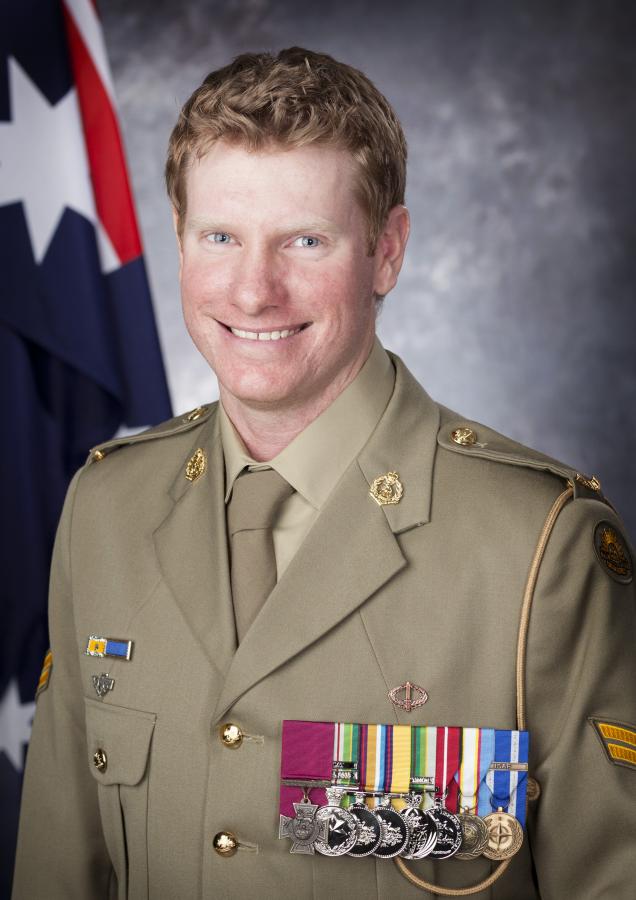
Corporal Daniel Keighran VC. Photo: Courtesy Defence
Inspired by his beloved grandfather, Allan Pyburne, a Second World War veteran, Daniel joined the army at 17.
“It’s no secret that there were limited options for me,” he said. “Employment opportunities up there in rural Queensland were just non-existent … It was either stay on the farm and work on the property, which wasn’t really that enticing to me, or Defence.
“Realistically, that was the only other option to, one, get a job, and two, get out of there, let’s be honest, but I think it was always destined to happen …
“My grandfather served in the Second World War, and without a doubt, he was my mentor – my hero even – and the reason why I joined Defence.
“He was certainly my father figure growing up – my dad went MIA – so he was very much an influence in my life from a young age.”
Daniel’s grandfather served in the Middle East and New Guinea with the 2/4th Field Regiment during the war and married his grandmother while on leave.
“He was a sergeant on the 25 pounders for the majority of the time, but he didn’t talk about the war with me until I said that I was going to join up,” he said. "He spoke about the adventures that he had, but he also talked about the ups and downs, and the highs and lows that you go through in the service of your country; the good times and the bad.
“Then when I met my dad, I found there was a proud history of service there as well; his father [John Keighran] was a Rat of Tobruk and had fought at El Alamein, so the army was always in the back of my mind from a young age.”
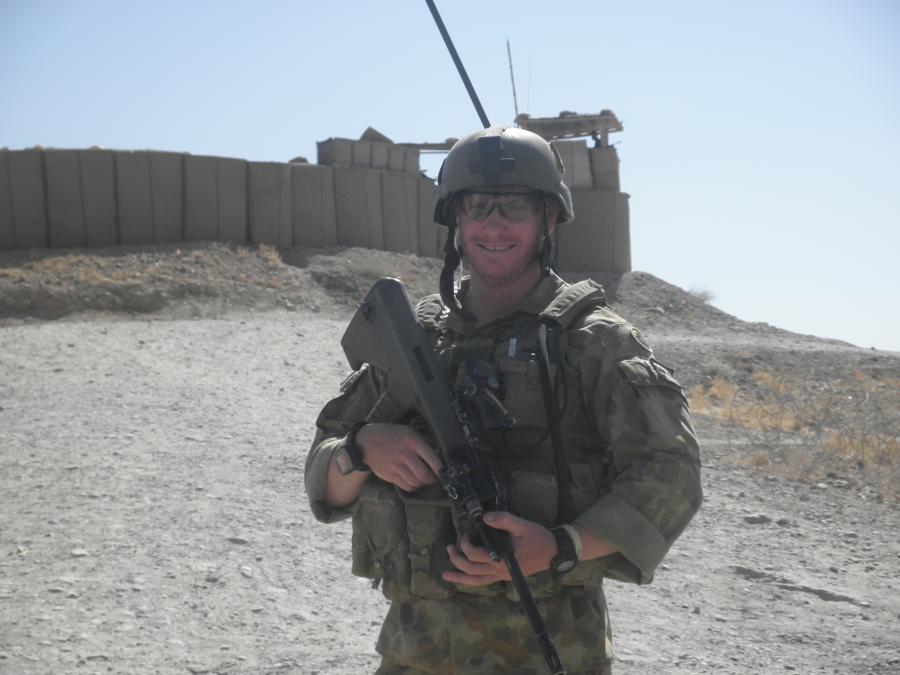
Corporal Daniel Keighran VC. Photo: Courtesy Defence
Daniel joined the Australian Regular Army in December 2000, three weeks after finishing high school.
“I still remember getting yelled at getting off the bus at Kapooka, and I don’t think the yelling stopped for the entire time that I was there for basic training, but I found it pretty easy in all honesty …
“I was a single guy at 17 who had just finished school and was on the adventure of a lifetime.
“I was used to hard work, and I was used to getting up early and working all day on the farm, so it wasn’t much of a stretch for me to get into the groove of army life.”
After completing recruit training at Kapooka and corps training at Singleton, he was posted to the 6th Battalion, Royal Australian Regiment (6RAR) at Enoggera Barracks, in Brisbane.
“I hadn’t even turned 18 yet,” he said. “And apparently I was a fully qualified infantry soldier, in a battalion, ready to go.”
He deployed to East Timor in 2003, Iraq in 2006, and went to Afghanistan in 2007 and 2010.
“It was a bit of the Wild West back then, and the seriousness of operations became apparent very quickly,” he said. “Up until that point, I could count on one hand the number of times I’d been shot at, and then I got to Afghanistan, and I lost count of how many times someone tried to kill me.”
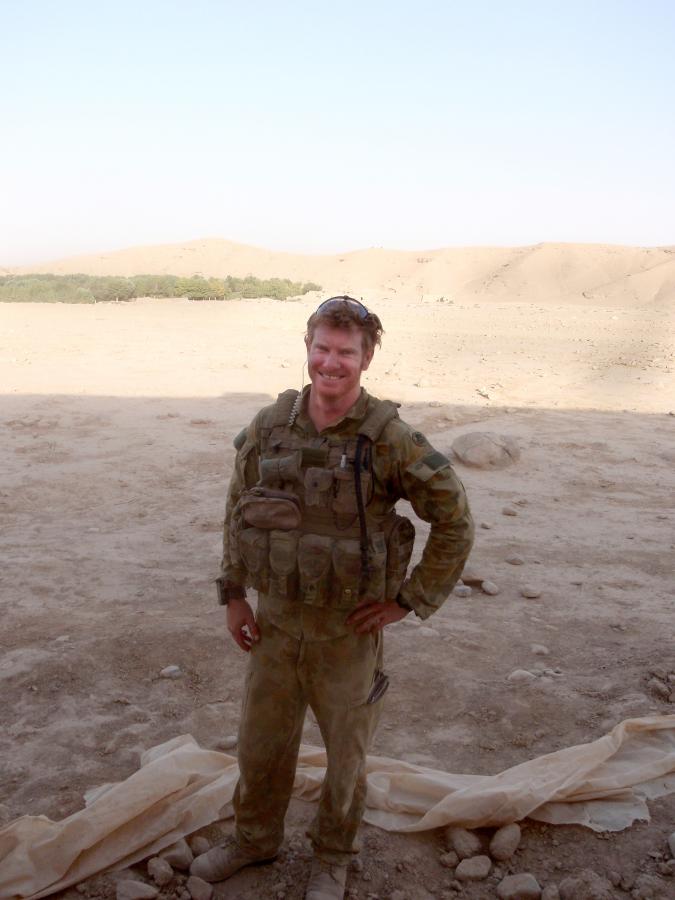
Corporal Daniel Keighran VC. Photo: Courtesy Defence
Daniel’s life would change forever during his second tour of Afghanistan. On 24 August 2010, he was part of a joint Australian and Afghan patrol in the village of Derapet in the Tangi Valley in Uruzgan Province.
“While the vehicles were going in, droves of women and children were leaving the village,” he said.
“We could see them picking up and leaving, so by the time we managed to get the vehicles securely in without getting blown up, and our full patrol marched off, we already knew that potentially something was going to happen.
“We’d been there a couple of days beforehand and there were kids playing and people working out in the fields, but none of that was going on.
“There were a few tumbleweeds, and a few dogs running around, but there were no real people, and no one waved at us … so there was already a heightened sense of awareness.
“I remember walking around one of the last buildings, and hearing that very familiar sound of a machine-gun firing at you.
“There was that thump, crack, as the bullet passes very close to you, like a whip cracking, and sure enough we were getting shot at.
“I knew pretty quickly it was pretty serious, and I remember running up this hill on the right-hand side. I was on this hill, on and off, for nearly three hours, but I nearly got killed straight away. I’d gone too far, and I’d exposed myself, so they could clearly see me, but it wasn’t just one guy shooting; it turned out there were probably 100 people waiting in a defended position – an ambush – and here I was standing on the hill like an idiot.
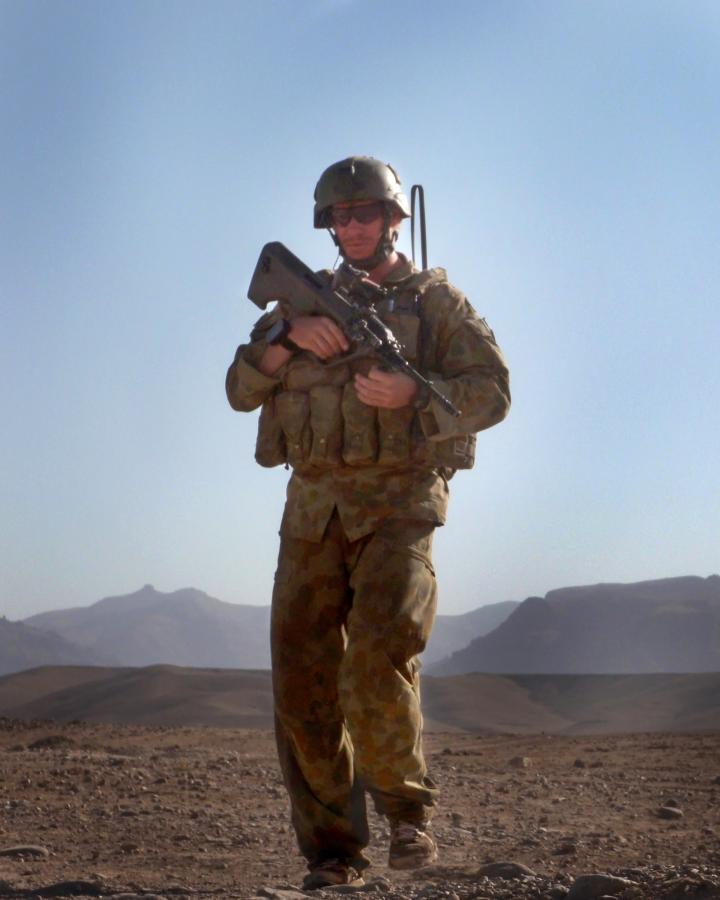
Corporal Daniel Keighran, VC. Photo Courtesy Defence
“Everyone saw me, and started shooting at me, and there was a little wave of bullets striking the ground around me.
“It was probably half an hour into this battle that I remember hearing a scream, or a shout, or a yell, or something, which was odd, and I remember looking over to my left-hand side. It was probably some 50 metres away, and I saw my mate Jared [MacKinney] lying on his back on the hill.
“It came over the radio not long after that we’d taken a casualty, and I assumed straight away that it was him, but it took another five or ten seconds to realise the seriousness of what was going on.
“I remember looking over again and all of sudden there’s not just him there; there’s five or six people around him, and they’re ripping his clothes off, and his armour off.
“I could see them doing CPR, and one of the engineers was on his knees doing compressions, and then another soldier grabbed this guy’s helmet, and ripped his helmet down just as a burst of machine-gun fire went through where his chest had been.
“It would have killed him, and I remember seeing that, and thinking if someone doesn’t do something now, and make a decision, they’re all about to die.
“So I came up with a quick plan, and my plan was pretty simple; it was to run along this hill, expose myself and my position, and let people know where I was so that they would start shooting at me and hopefully stop shooting at Jared and the rest of the guys.
“It was more of a gamble than anything, but I thought it would also give our guys time to get into position and identify targets.
“It was a very quick plan, and I still remember the look on the gunner’s face when I told him what I was going to do.”
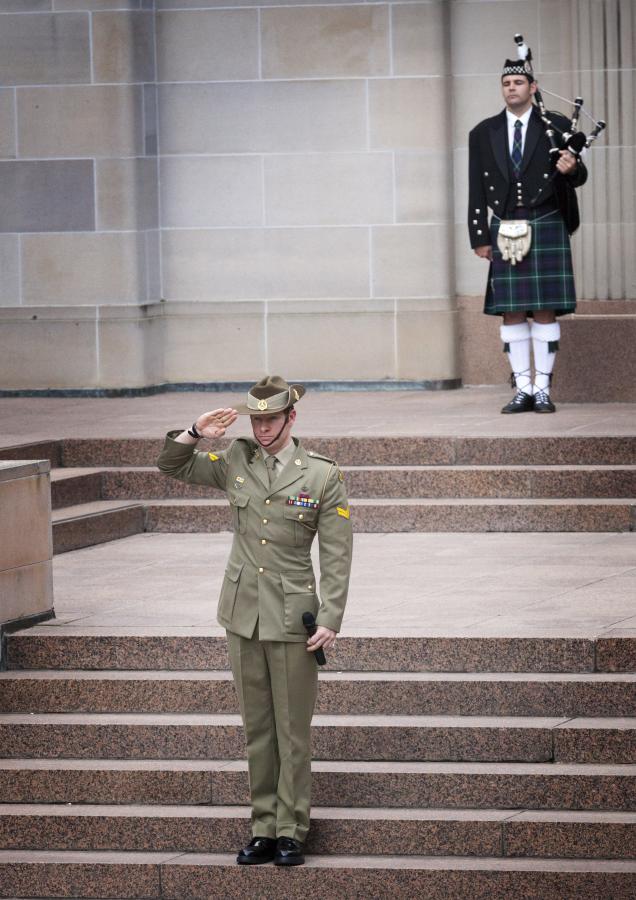
Corporal Daniel Keighran VC at a Last Post Ceremony at the Memorial. Photo: Courtesy Defence
As soon as he stood up, he heard the thump, crack of a bullet travelling past his head.
“Sure enough, it was like if you’re watering the garden with a hose,” he said. “The bullets were chasing me like a stream of water along this hill – in front of me, behind me, and all around me.
“I should have been dead the first time, and I ended up doing it three times in total because it was working; they were literally following me instead of the team doing CPR and dragging my mate off the hill.”
After the third run, he ran back across the hill to provide security to his fellow soldiers as they fought to save his mate’s life.
“Probably one of the hardest things in my life was that walk back from the contact site to our patrol base,” he said. “It was probably only about 1800 metres in total, but we knew Jared was dead.
“I wasn’t frightened or concerned for my own life, but I was fearful of letting the team down, or not doing enough.
“I expected to get shot when I was doing those runs, let’s be honest, but I had my body armour on, front and back, and my helmet, and I had faith and trust in my team.
“I had no other option. There was nothing else we could do. We couldn’t identify the target, and it was better than doing nothing, so it was one of those things, where I’m like, ‘I hope this works.’
“I probably should have been killed doing what I was doing, and I remember my body shutting down around me, but I wasn’t going to stop.”
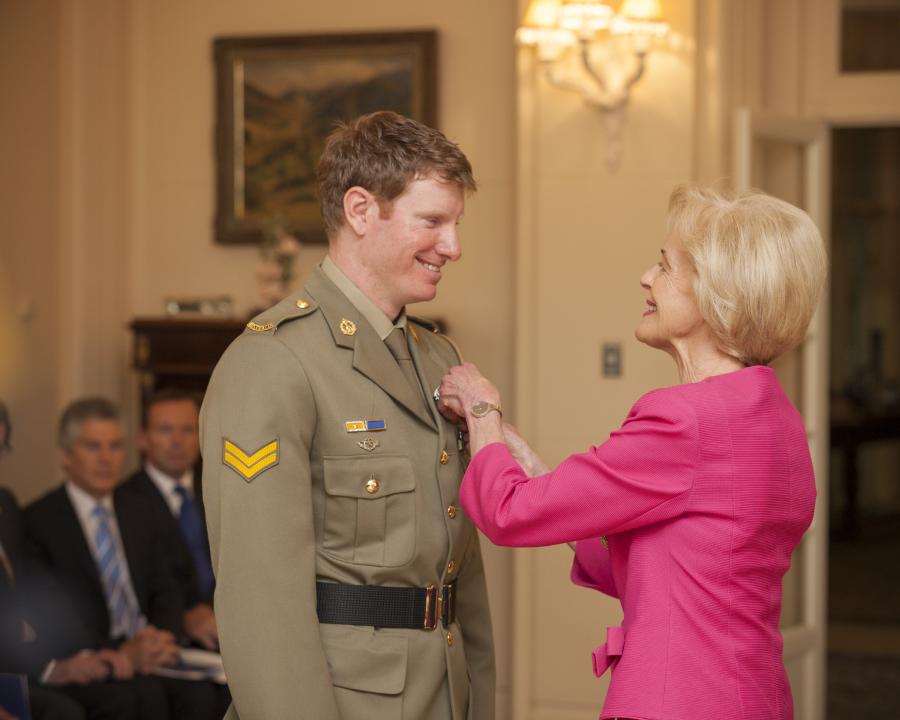
Corporal Daniel Keighran VC was awarded the Victoria Cross for Australia at an Investiture Ceremony at Government House in Canberra on 1 November, 2012. Photo: Courtesy Defence
Two years later Daniel learnt that he had been awarded the Victoria Cross. By this time he had left the army and was working at a gold mine in Kalgoorlie, Western Australia.
“It was a whole other world,” he said. “I was blasting underground this particular day, and I have no idea why, but I came up, and checked my phone. It’s a 30-minute drive from the bottom of the mine, and the phone was ringing, and it was the Chief of Army.
“He said he had the jet and he was coming to Kalgoorlie to see me. I was starting to get worried, as you would, and I’m thinking, what’s happened, what have I done, and all that sort of business, but it was the Chief with the letter on behalf of the Queen, saying do you accept this nomination for the Victoria Cross?
“I was stunned and tremendously honoured, but also reticent, for I was not the only person on the battlefield that day.
“I remember talking to my now ex-wife, Kathryn, and saying this is an opportunity to tell their story – my mates’ story – and shine a light on the great work that the Defence Force has been doing, and that was the only reason I accepted.”
He was presented with the Victoria Cross at an investiture ceremony at Government House in 2012, surrounded by his mates and his family.
“I would be dead without these guys, and I say that all the time; I would not be alive if it wasn’t for these guys on the ground there supporting each other,” he said.
“I wouldn’t have made it, so it’s for all those guys who were there that day, and it’s an opportunity to tell all of our stories.
“Those experiences change you – for good and bad – and I’m one of the lucky ones …
“The mateship and the bonds you forge with will no doubt remain for the rest of our lives.”
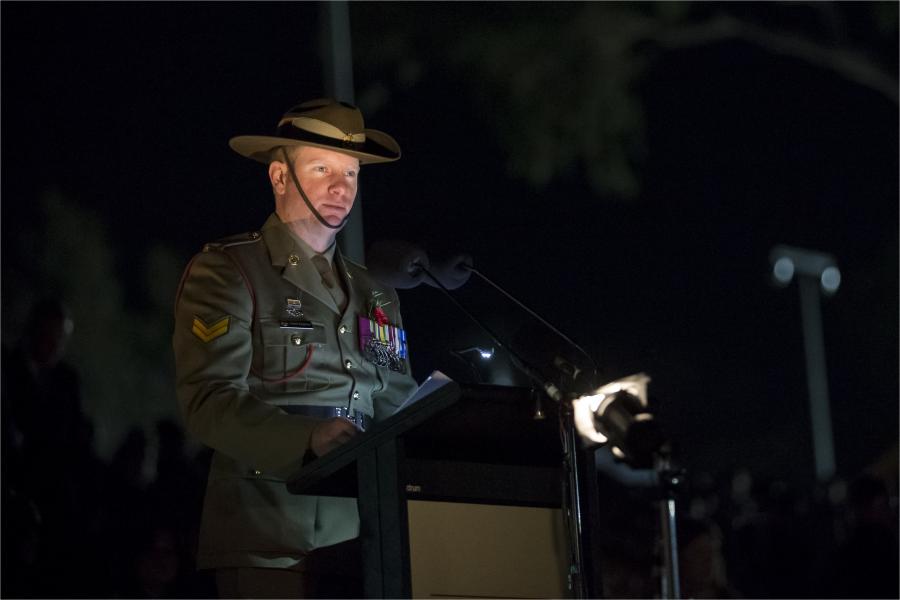
Corporal Daniel Keighran VC reads excerpts of letters and diaries of Australians who experienced the First World War firsthand prior to the commencement of the Anzac Day Dawn Service at the Australian War Memorial in Canberra in 2015. Photo: Courtesy Defence
Today, he is proud to be a member of the Council of the Australian War Memorial.
“Once upon a time, the Memorial was about other wars, but now it is very close to home,” he said.
“A lot of guys I know are now on that Roll of Honour, so for me, it is a special place to go and remember them, and that’s exactly what I do; I go and remember those that I served with, and those that have lost their lives, and are no longer there.
“I don’t know how many mates have told me how much it means to them; it’s a place where they can tell their stories and tell their sons and daughters what they did.”
The Memorial is currently undergoing a $500 million development to help tell the stories of more recent conflicts, peacekeeping and humanitarian operations.
“When it’s finished, it’s going to be world class, and I really look forward to seeing the doors open,” he said. “It’s important to continue to tell the stories as our history evolves, and I don’t think it should be 30 years later on, I think it should be told as soon as possible, and as accurately as possible; the good and the bad.”
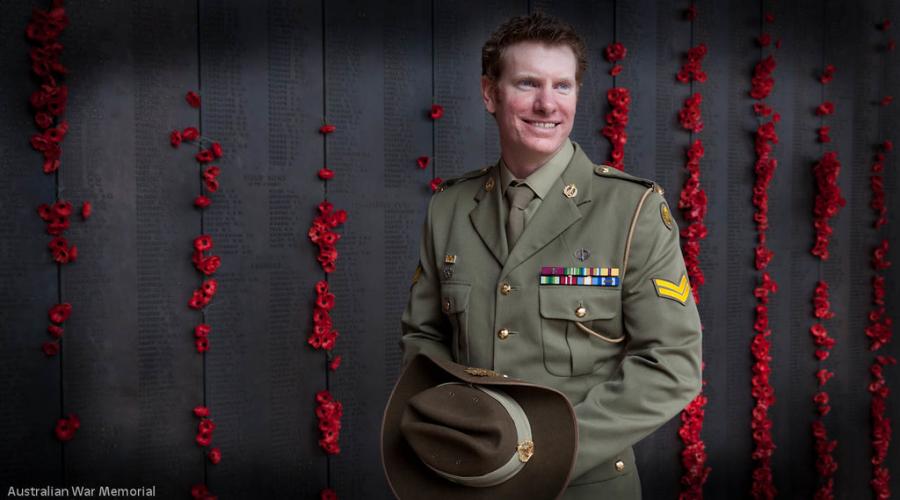
Today, Daniel’s photograph and citation are on display in the barracks at Kapooka, and his medals are on display in the Hall of Valour at the Memorial.
“It’s nearly a lifetime ago now, and there I am on the wall with the other Victoria Cross recipients,” he said quietly.
“I still look at it, and I don’t believe sometimes that it is there – a great mugshot of me with the red hair and that, on the wall with the citation.
“I’ve got more used to it – as much as you can, I suppose – as the years have gone on, but a tremendous honour like that changes your life, and it continues to change my life.
“When you go into an RSL even, and there’s your photo on the wall with the citation; I’ll never get used to it, I don’t think – I really won’t.
“It is one of those things; you should be dead for an action like that, and we all say the same thing, for what we did we probably shouldn’t be alive.
“I never regret anything, and I’d do it again, but I tell you what, I really wish my grandfather had been around to see that because he really was my hero – my mentor – and I really looked up to him as a kid.
“I often think about how he would have reacted and how he would have felt, but he would have been extremely proud without a doubt. I think he would have been absolutely over the moon, and I know he would have been so proud of me.”
Daniel Keighran's medals are on display in the Hall of Valour at the Australian War Memorial. His book, Courage under fire, written with Tony Park, is available in the Memorial shop.